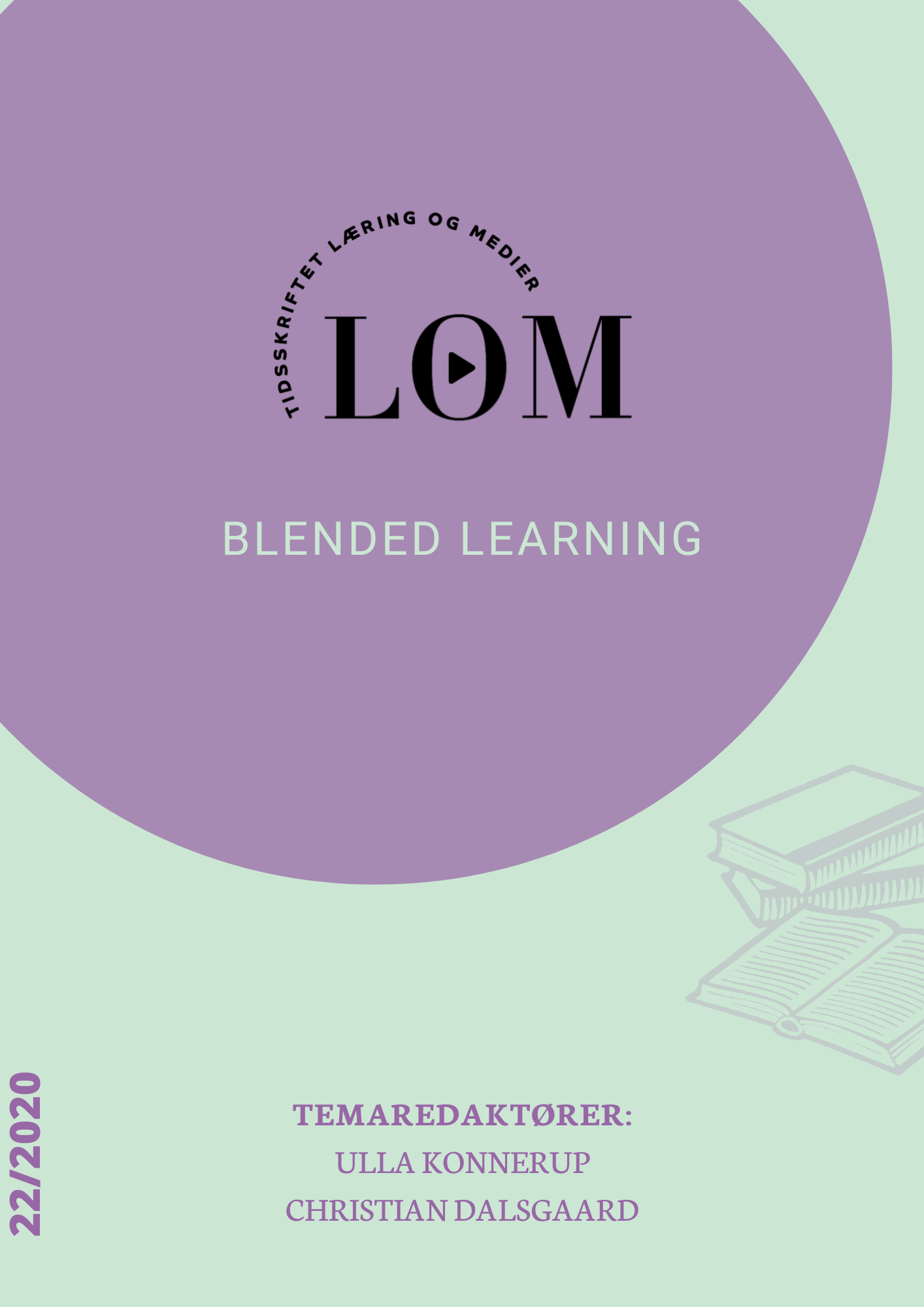Mening og relationer i flipped learning
En undersøgelse af de studerendes oplevelse af et flipped learning undervisningsforløb i videnskabsteori”.
DOI:
https://doi.org/10.7146/lom.v12i22.119678Nøgleord:
flipped learning, mening, relationerResumé
Artiklen præsenterer en undersøgelse af. hvorvidt og hvordan de studerende oplevede et flipped learning undervisningsforløb i videnskabsteori som relevant, samt hvilke dele af undervisningen, de oplevede, understøttede deres læring.
Et mindre mixed methods design blev benyttet. 36 studerende besvarede et spørgeskema med både kvalitative og kvantitative items, og vi udførte fokusgruppeinterview med 4 studerende. En fortolkende fænomenologisk metode- og analysedesign blev benyttet. Fire temaer blev fremanalyseret på baggrund af det kvalitative data: 1. Mening, 2. Forberedelse og deltagelse, 3. Forventninger og 4. Relationer.
Undersøgelsen viste, at de studerende i høj grad oplevede flipped learning undervisningsmetoden som relevant og understøttende for deres læring, men at dette hang sammen med, at undervisningen blev gjort meningsfuldt for dem af underviser, og at de oplevede tryghed i relation til underviser, medstuderende og i læringskonteksten. Mening og relationer i læringssituationer var centralt for at de studerende blev aktive medskabere af egen læring og indgik i de relationelle læringsprocesser.
Downloads
Referencer
Barkley, E. (2010). Student engagement techniques. A handbook for college faculty. Jossey-Bass.
Bruner, J. S. (1999). Uddannelseskulturen (1. udgave, 5. oplag ed.). Hans Reitzel.
Bryman, A. (2001). Social research methods. Oxford University Press.
Bryson, C., & Hand, L. (2007, 2007/11/01). The role of engagement in inspiring teaching and learning. Innovations in Education and Teaching International, 44(4), 349-362. https://doi.org/10.1080/14703290701602748
Dohn, N. B., & Dolin, J. (2015). Forskningbaseret undervisning. In L. Rienecker, P. S. Jørgensen, J. Dolin, & G. H. Ingerslev (Eds.), Universitetspædagogik (3 ed.). Samfundslitteratur.
Dysthe, O. (2003). Dialog, sampil og læring. Klim.
Estes, M. D., Ingram, R., & Liu, J. C. (2014). A review of flipped classroom research, practice, and technologies. International HETL Review, 4(7), 1-8.
Green, J., & Thorogood, N. (2004). Qualitative Methods For Health Research. . SAGE Publications Ltd.
Halkier, B. (2016). Fokusgrupper (3. ed.). Samfundslitteratur.
Healey, M. (2005, 2005/07/01). Linking Research and Teaching to Benefit Student Learning. Journal of Geography in Higher Education, 29(2), 183-201. https://doi.org/10.1080/03098260500130387
Healey, M., Jordan, F., Pell, B., & Short, C. (2010, 2010/05/01). The research–teaching nexus: a case study of students' awareness, experiences and perceptions of research. Innovations in Education and Teaching International, 47(2), 235-246. https://doi.org/10.1080/14703291003718968
Hockings, C., Cooke, S., Yamashita, H., McGinty, S., & Bowl, M. (2008, 06/01). Switched off? A study of disengagement among computing students at two universities. Research Papers in Education, 23, 191-201. https://doi.org/10.1080/02671520802048729
Krathwohl, D. R. (2002, 2002/11/01). A Revision of Bloom's Taxonomy: An Overview. Theory Into Practice, 41(4), 212-218. https://doi.org/10.1207/s15430421tip4104_2
Kugel, P. (1993, 1993/01/01). How professors develop as teachers. Studies in Higher Education, 18(3), 315-328. https://doi.org/10.1080/03075079312331382241
Kvale, S., & Brinkmann, S. (2009). InterView: Introduktion til et håndværk [Interview: Introduction to a craftmanship] [InterViews] (2 ed.). Hans Reizels Forlag.
Lage, M., Platt, G., & Treglia, M. (2000, 12/01). Inverting the Classroom: A Gateway to Creating an Inclusive Learning Environment. Journal of Economic Education, 31, 30-43. https://doi.org/10.1080/00220480009596759
Mason, G. S., Shuman, T. R., & Cook, K. E. (2013). Comparing the Effectiveness of an Inverted Classroom to a Traditional Classroom in an Upper-Division Engineering Course. IEEE Transactions on Education, 56(4), 430-435. https://doi.org/10.1109/TE.2013.2249066
O'Flaherty, J., & Phillips, C. (2015). The use of flipped classrooms in higher education: A scoping review. The internet and higher education, 25, 85-95.
Obwegeser, N., & Papadopoulos, P. (2016, 01/01). Integrating research and teaching in the is classroom: Benefits for teachers and students. Journal of Information Systems Education, 27, 249-258.
Pierce, R., & Fox, J. (2012). Vodcasts and active-learning exercises in a "flipped classroom" model of a renal pharmacotherapy module. American journal of pharmaceutical education, 76(10), 196-196. https://doi.org/10.5688/ajpe7610196
Sfard, A. (1998, 03/01). On Two Metaphors for Learning and the Danger of Choosing Just One. Educational researcher, 27, 4. https://doi.org/10.2307/1176193
Smith, J. A., Flowers, P., & Larkin, M. (2009). Interpretative Phenomenological Analysis. Theory, Method and Research. SAGE Publications Ltd.
Smith, J. A., & Osborn, M. (2003). Interpretative phenomenological analysis. In J. A. Smith (Ed.), Qualitative psychology: A practical guide to research methods (pp. 51-80). Sage.
Smith, J. A., & Osborn, M. (2008). Interpretation phenomenological analysis. In J. A. Smith (Ed.), Qualitative psychology: A Practical guide to reseach methods (pp. 51-88). SAGE Publications Ltd.
Stead, D. R. (2005). A review of the one-minute paper. Active learning in higher education, 6(2), 118-131.
Talbert, R. (2014). Flipped learning skepticism: Is flipped learning just self-teaching?
Wilson, S. G. (2013). The flipped class: A method to address the challenges of an undergraduate statistics course. Teaching of Psychology, 40(3), 193-199. https://doi.org/10.1177/0098628313487461
Downloads
Publiceret
Citation/Eksport
Nummer
Sektion
Licens

Artikler publiceret i Tidsskriftet for Læring og Medier er licenseret under en Creative Commons Navngivelse-IkkeKommerciel-IngenBearbejdelse 4.0 Unported Licens.
Forfattere bevarer deres ophavsret og giver tidsskriftet ret til første publicering, samtidigt med at værket er omfattet af Creative Commons Attribution-licensen: Navngivelse – Ikke-kommerciel - Ingen Bearbejdede Værker (by-nc-nd). Læs om licensen på http://www.creativecommons.dk/om/.
---
På LOM.dk kan du endvidere finde artikler fra det nu nedlagte Tidsskrift for Universiteternes Efter- og Videreuddannelse (UNEV). Vær opmærksom på, at der gælder særlige regler for UNEV artikler:
Det er forfatterne og evt. andre ophavsret indehavere, der har ophavsretten til artikler udgivet i UNEV regi, og det er en betingelse for adgang til artiklerne, at brugere anerkender og overholder de juridiske retningslinjer forbundet hermed.
- Brugere må downloade og printe én kopi af en hvilken som helst UNEV artikel mhp. private studier eller forskning.
- Det er ikke tilladt at videredistribuere artikler eller anvende disse til indtægtsdækkede aktiviteter eller kommercielle formål.
- Det er tilladt at distribuere URL’en til UNEV artikler.


